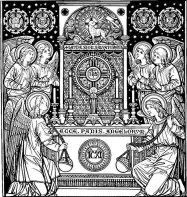Dear Friends in Christ,
The Sacrament of the Eucharist completes our Christian initiation – most of us as children, some as adults. The Eucharist was instituted at the Last Supper, on the night Jesus was betrayed, in order that the sacrifice of the cross would be perpetuated, from that moment on until the end of time.
 The Eucharist is many things but most importantly it is a memorial of Jesus’ death and resurrection. It is a sacrament of love, a sign of unity, a Paschal banquet. To describe the Eucharist, the Second Vatican Council coined the phrase ‘the source and summit of faith’ (Lumen gentium 11). This is because when we receive the Eucharist, we consume Christ himself, our minds are filled with grace and we receive a pledge of future glory. We are a people of the Eucharist, and our way of life is attuned to the Eucharist.
The Eucharist is many things but most importantly it is a memorial of Jesus’ death and resurrection. It is a sacrament of love, a sign of unity, a Paschal banquet. To describe the Eucharist, the Second Vatican Council coined the phrase ‘the source and summit of faith’ (Lumen gentium 11). This is because when we receive the Eucharist, we consume Christ himself, our minds are filled with grace and we receive a pledge of future glory. We are a people of the Eucharist, and our way of life is attuned to the Eucharist.
As early as the second century we have the witness of St. Justin Martyr, whose feast-day we marked only a few days ago, for the basic lines of the order of the Eucharistic celebration, which have stayed the same until our own day. Writing to the pagan emperor Antoninus Pius around the year 155, he explained: ‘On the day we call the day of the sun, all who dwell in the city or country gather in the same place. The memoirs of the apostles and the writings of the prophets are read, as much time permits. When the reader has finished, he who presides over those gathered admonishes and challenges them to imitate these beautiful things. Then we all rise together and offer prayers… When the prayers are concluded we exchange the kiss. Then someone brings bread and a cup of water and wine mixed together to him who presides over the brethren. He takes them and offers praise and glory to the Father of the universe, through the name of the Son and of the Holy Spirit and for a considerable time he gives thanks (in Greek: eucharistein) that we have been judged worthy of these gifts. When he has concluded the prayers and thanksgivings, all give voice to an acclamation by saying “Amen.” When he who presides has given thanks and the people have responded, those whom we call deacons give to those present the “eucharisted” bread, wine and water and them to those who are absent.
